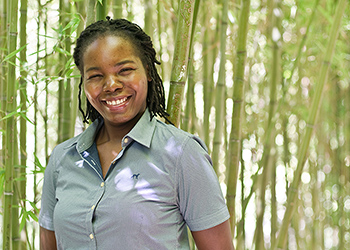Solar energy in the future of Mozambique

Rosa Chilungo is 34 years of age, Mozambican, and a student on the first doctoral degree program in Energy Science and Technology at the Eduardo Mondlane University in Mozambique, a partner entity of the Calouste Gulbenkian Foundation for various decades. Rosa Chilungo spent six months at Portugal’s Higher Technical Institute under the auspices of the scientific internship program backed by the Foundation and by the national grid operator REN and with the objective of internationalising the experiences and contacts of Mozambican researchers with the science and tools produced outside their country.
A lecturer in Physics and Electronics at the Pedagogical University of Mozambique, Rosa Chilungo, who was one of four doctoral degree students chosen for the internship program, shows no hesitation in praising the experience: “Internationalisation and contacts with other types of researcher are very important. Understanding the dynamics of science in other places, with greater availability and better time management, is very useful.”
Rosa Chilungo’s research consists of developing and evaluating the potential of solar powered systems for irrigation in the specific case of fields of tomato. “The surplus of tomato production gets wasted”, she explained, “there are no means of preservation, not even refrigeration systems and also with few processing systems. The objective is to apply the remaining energy to these ends, for periods of lower levels of production.”
Despite working directly with the tomato crop, the researcher accepted that “given the close proximity to settlements, the energy remaining after having served for irrigation might serve for the domestic purposes of the farmer”.
In Mozambique, only around 27 per cent of the population have access to electricity from the national grid, a very low level of electrification that stems from the population’s high level of dispersion. “Extending the grid, in order to get it out to more remote rural areas, is extremely costly for a level of consumption that is often only minimal, such as a bulb, a radio or television”, she explained. According to Rosa Chilungo, solar power holds enormous importance to her country given that this may be set up through a decentralised approach, with small autonomous systems, which power a single house or a small network to supply a community.
Now, she is already working with the electronics and renewable energies department of the Pedagogical University, where she is developing a rural electrification project that fosters access to energy at a low cost through recourse to photovoltaic systems. Mozambique has made major progress with such decentralised systems through the National Energy Fund and the Atlas of Renewable Energies, which signposts areas with different types of renewable energy potential. Rosa Chilungo praised these improvements and wishes to continue researching and resolving the specific problems of her country. “I want to advance with a post doc, even if at a university elsewhere, but the experimental field of study, and for the resolution of problems, needs to be Mozambique.”
